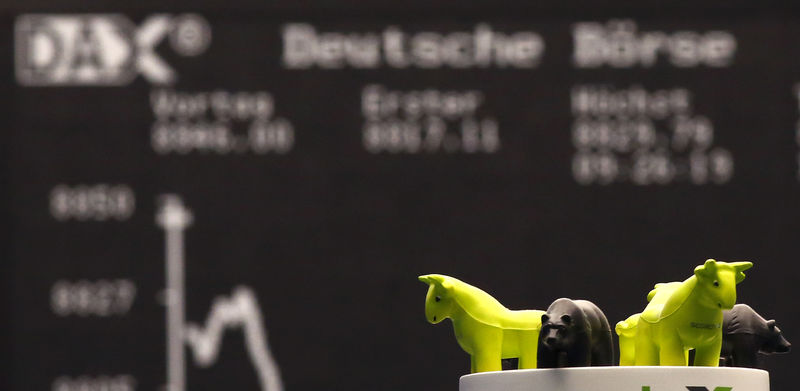Investing.com - European stock markets are expected to open lower Thursday on growing worries around China’s stuttering economy and the potential for higher U.S. interest rates.
At 02:00 ET (06:00 GMT), the DAX futures contract in Germany traded 0.6% lower, CAC 40 futures in France dropped 0.7% and the FTSE 100 futures contract in the U.K. fell 0.3%.
European equities are likely to take their lead from Wednesday’s weak close on Wall Street on renewed concerns of a continued hawkish stance from the Federal Reserve.
Fed minutes offer hawkish slant
The minutes of the Fed’s July meeting showed a number of officials still saw the need for more interest rate hikes to combat still elevated inflation levels, potentially weighing on economic activity in the world’s largest economy, a major global growth driver.
“Most participants continued to see significant upside risks to inflation, which could require further tightening of monetary policy,” according to minutes published Wednesday in Washington.
Additionally, the July Fed meeting came before a raft of U.S. data that underscored the resilient economy.
Fitch may look at downgrading China’s rating
Adding to the negative sentiment was the news that rating agency Fitch Ratings may consider rethinking China’s A+ sovereign credit rating, especially if corporate debt conditions worsen and the government expands its balance sheet to support the companies.
This comes amid fresh concerns about the country’s property sector, which have contributed towards Chinese economic growth slowing sharply in the second quarter of 2023.
Few economic cues from Europe
Back in Europe, the economic data slate is quiet, with the eurozone’s trade balance for June unlikely to move the needle.
Dutch payment company Adyen (AS:ADYEN), Danish medical devices manufacturer Coloplast (CSE:COLOb) and Swiss plumbing supplier Geberit (SIX:GEBN) are on deck for earnings.
Crude slips as U.S. production hit three-year high
Oil prices slipped lower Thursday, dropping to two-week lows, amid worries that slowing growth in China and a continued hawkish stance from the Federal Reserve will weaken fuel demand in the world's two biggest economies.
These concerns have outweighed a bigger-than-expected draw in U.S. inventories, especially after Energy Information Administration data also showed that U.S. production hit a new three-year high last week, close to the record-high levels produced before the COVID-19 outbreak in 2020.
By 02:00 ET, the U.S. crude futures traded 0.2% lower at $79.22 a barrel, while the Brent contract dropped 0.1% to $83.39. Both contracts were at their weakest level in two weeks, and were now down for a fourth consecutive session.
Additionally, gold futures rose 0.3% to $1,922.65/oz, while EUR/USD traded largely flat at 1.0873.
